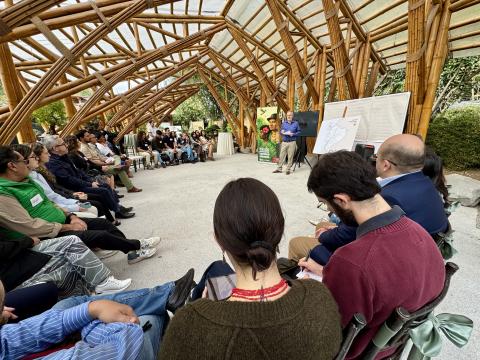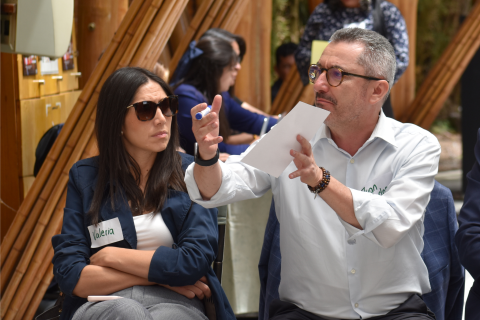FFLA hosts dialogue to reflect on ethics and climate action ahead of COP30
FFLA hosts dialogue to reflect on ethics and climate action ahead of COP30
On 16 September, Fundación Futuro Latinoamericano (FFLA), a CDKN partner, convened women leaders, community representatives, activists and conservation groups from across Ecuador to reflect on the ethics of the climate crisis. The dialogue formed part of the Global Ethical Stocktake, contributing to efforts to identify the root causes of the crisis and propose ethical, collaborative solutions ahead of COP30 in Brazil.
The Global Ethical Stocktake is a centerpiece of the COP30 Presidency, and forms part of the ‘mutirão’ concept that emphasises a global collective effort to drive climate action and ambition. In particular, the Global Ethical Stocktake aims to promote a collective ethical analysis that recognises geographic, gender, generational, economic, and ethnic diversity, in order to foster a just, inclusive, and deeply humane response to the climate crisis.

The meeting used a horizontal and participatory approach – through the structure of a social circle inspired by ancestral community practices of dialogue and decision-making – with the aim of de-hierarchising the space and encouraging the free expression of all voices. Its objectives were to foster ethical debate on climate action, integrating voices from traditionally marginalised communities and groups, and to develop collective proposals that will mobilise public opinion and help inform the decisions to be discussed at COP30.
In an initial process of integration and introductions, participants shared their names and places of origin, covering the Coast with Esmeraldas, Manabí, Guayas, and El Oro; the Sierra with Tulcan, Pichincha, Azuay, and Loja; the Amazon with Sucumbios, Napo, and Pastaza; and the Insular Region with the Galapagos Islands, reflecting the wealth of voices and perspectives from which the climate crisis in Ecuador is being addressed.
"Ethics does not exclude anyone; the perspectives of all people are important."
– Marina Silva, Minister of Environment and Climate Change of Brazil
The workshop revolved around two main questions :
-
From the perspective of local and ancestral knowledge, what are the root causes of the climate crisis?
-
What ethical and collaborative strategies (including local and ancestral knowledge and practices) can mobilise the construction of a more just and sustainable future in the face of the climate crisis?
Regarding the causes discussed, it was mentioned that the climate crisis is not only environmental, but also ethical and cultural. The expansion of an extractivist development model, driven by material accumulation and capitalist logic, has generated profound inequalities and weakened the community foundations that sustain life. This anthropocentric, patriarchal, and colonial paradigm prioritises economic growth and material well-being over environmental stewardship and social equity, reinforcing a vision in which nature is an unlimited resource, not a subject of rights.
"The ethic of care is what we lack. Nature is more important than profit."
– Ramiro Ávila, Machángara River Protection Action
Added to this is a lack of awareness and empathy, the separation between the human and the natural, and the imposition of the individual over the collective. The marginalisation of ancestral languages and knowledge – such as Sumak Kawsay or Buen Vivir – and the predominance of rigid hierarchies weaken community organisation and hinder ethical and sustainable alternatives. The devaluation of food sovereignty, expressed in practices such as monoculture farming, reinforces this disconnect.
Furthermore, there is a communication gap. The technical and scientific language of climate change is often inaccessible to communities, which prevents genuine ownership of the problems and solutions. Together, these factors reinforce an unsustainable way of life, in which reliance on ‘development’ replaces the pursuit of harmony with nature, putting life itself on the planet at risk.
“Scientific knowledge often prevails over community knowledge. The IPCC reports, for example, are prepared from a global perspective that superimposes its narrative on ancestral and local knowledge. The true roots of climate action come from peoples and their ancestral knowledge.”
– Eliana Muñoz, National Council for Gender Equality
“Everyone is suffering the impacts of climate change, but local and rural communities are the most affected, while decision-making remains centralized in cities. As a community representative, I emphasise the importance of taking action from our own spaces.”
– Enrique Mero, Saving Ecosystems
Several avenues for alternatives were identified, including promoting active community participation methodologies and reconstructing ancestral knowledge from new perspectives. These actions seek to generate new climate narratives that redefine the concept of development, recognise nature as a subject of rights, and facilitate the convergence of local, ancestral and technical knowledge.
Likewise, ethical and collaborative strategies are required that recognise that the problem is environmental, social, and above all structural. Likewise, the need to place the care of human beings and the planet at the centre of the model was highlighted, and to redefine production and economic models toward sustainable ones that, rather than promoting infinite economic growth, allow for ways of life that coexist with nature. The driving force must be cooperation and collective well-being, prioritising respect for human rights and the rights of nature.
Building a just and sustainable future depends on open dialogue between ancestral, community and technical knowledge. This requires valuing diverse perspectives, promoting gender equality, and ensuring social inclusion in every process, conversation and decision. In other words, communities must be recognised as protagonists of their own processes and supported and strengthened to design solutions tailored to the complexity of each territory.
Additionally, the importance of decolonising the climate agenda, making information accessible, promoting environmental and social education and awareness from an early age, forging collaborative networks between communities, organisations, governments, and other stakeholders, and fostering practices of respect, reciprocity, co-responsibility, and connection with nature was mentioned.
“We must involve Amazonian women in decision-making ”
– Mariana Vargas. Association of Achuar Women Agroecological Producers – Achuar Community

“There must be a protocol of understanding that ensures that ancestral knowledge remains pure, unfiltered by external perspectives, and that the role of communities is recognized as paramount.”
– Juan Carlos Palacios – Sacha Award
From this dialogue on the root causes of the climate crisis and the ethical and collaborative alternatives to address it, collective reflections emerged that highlighted the need to:
-
Strengthen community organisation and local alliances.
-
Recognise and articulate ancestral knowledge with contemporary knowledge.
-
Promote environmental education and awareness from an early age.
-
Ensure transparency and access to information in clear and accessible language.
It was also emphasised that climate action must be linked to social justice, human and nature rights, as well as public health and collective well-being. Finally, the role of youth in building more just and equitable spaces was highlighted, as well as the importance of rethinking the current development model and questioning false global solutions.
Among the collective conclusions, respect for life in all its forms and the right of nature were highlighted, as well as the importance of strengthening community spaces as a basis for addressing the climate crisis. Participants agreed that, beyond numbers and statistics, Ecuador can contribute solutions based on shared responsibility and the urgent need to rethink the current development model. It was emphasised that ethics must be present in all climate solutions and activities implemented.
FFLA made a commitment to systematise the information generated at the workshop and bring this message to the global BEG process and to COP30.
The meeting in Ecuador demonstrated that addressing the climate crisis requires listening to and uniting diverse voices. This space for dialogue, reflection, and collective construction seeks to mobilise public opinion and inspire decision-makers participating in COP30, reaffirming that the most just and sustainable solutions emerge from inclusive dialogue, participation, and respect for life in all its forms.
You can read the original article published in Spanish here
